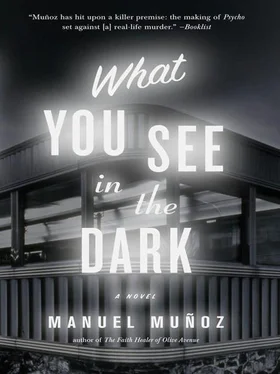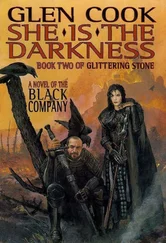Spring came, the light sharper in the window, Arlene walking across the street, where she could drop a few coins into the aluminum stand for a copy of the Times. During the postlunch afternoon lull, she would read with increasing interest about the world outside Bakersfield: catastrophic earthquakes in Chile, missiles firing into the skies above the vast oceans, the threatening pulse of the Russians, border skirmishes in Africa becoming near blooms of war. The rubble of the world clouded out her own. She let her eyes rest on sports scores, the columnists eagerly awaiting the baseball season. She read of Kennedy and Johnson, a photograph of Stevenson’s bald head reminding her once again that, indeed, the years had passed, even though her mind insisted on marking time only from the murder in December. It couldn’t be so, she told herself, and opened the folds of the newspaper to bring the world in. Sometimes the arts beat covered the passage of a traveling photography exposition, and Arlene began to read of ancient pottery and medieval paintings with a mixture of awe and regret that such things existed in the world and she had no way of seeing them. European dance troupes pranced across Los Angeles stages, and after more than a few afternoons of making herself read the reviews, another kind of regret began to manifest itself, too: that she could understand, at least a little bit, the measure of argument and feeling that went into such reviews, and that the most joyous of them sparked in her a thirst to see a thing with her own eyes. When that feeling bubbled within her, she’d smooth the newspaper flat on the café counter and look up, the harsh light of Bakersfield coming through the plate windows. Spring had changed to summer.
The heat appeared to make everyone forget about what had happened in December. In June, the bowling alley put up a new neon sign, so big that it obscured the window of the apartment above, the place where that girl used to live. Sometimes, Arlene would drive by, urged on by a need to see a light on in the window, some sign that the landlord had rented the apartment out again. She was within the safety of her own vehicle, and yet she looked up warily and with a bit of shame, only to see the window always dark and empty of a curtain or a shade, as sure a sign as any that, months later, the apartment remained still and bare.
Was she the only one who knew this? Was everyone forgetting? As much as she wanted the town to forget, she found herself helpless at the thought of such obliteration, the world overwhelming everything it could contain. The wide pages of the newspaper brought story after story, and even in the middle of summer, when she politely declined the telephone solicitation to resubscribe to the town newspaper she never read, Arlene was certain that even the story of the girl was fading in the minds of everyone in town, tumbling past rumor and into the darker jaws of complete erasure.
People left her alone. By July, most of the farmers regained a distinct comfort around her, and those who remained for a leisurely cup of coffee in the afternoon borrowed sections of the Times and spoke with her about Cuba and Nixon and the Chicago Cubs and the resurgent Germans. More and more of the men took the front section and the editorials and the sports columns, but she tucked the arts pages under the counter, her own private and more mature version of the daydreaming the girls still did over their movie magazines. The cinema postings sometimes boasted full-page advertisements for films soon to premiere in Los Angeles, the ink so profuse that it rubbed black on her thumbs, but Arlene liked the way she thrilled to the promise of a coming film, along with the attendant glamour of its premiere. She knew it would be weeks before the Jack Lemmon picture arrived in Bakersfield, and that the Italian films, with their curiously abstract but beguiling posters, would never show up at the Fox, but she scanned the advertisements daily whenever a weekend approached, as if the films themselves held something extraordinary in the promise of their arrival.
One day, that Actress’s face appeared in an advertisement. The lettering of the film title cracked itself over the page, spread jagged like a plate dropped and shattered on the café floor. The Actress looked over her shoulder, mouth agape in a silent scream. Arlene studied it for a moment before raising her head from the counter and looking over at the booth where she remembered that Actress sitting. It was empty now, but she could see her clear as anything, her kind face somehow able to communicate her need to be left alone. And yet there she was on the page, the advertisement’s crooked terror a stark dismissal of what Arlene thought she knew about that Actress, passing through town.
The next day, the same advertisement appeared in a larger size, the silhouette of a foreboding house added to the background. Arlene hadn’t bothered, the previous day, to pay attention to the cramped credits running along the bottom, but today, because of the larger size, she could read the names, and when she spotted the Director, she saw, as if it were just yesterday, that man’s face peeking out at her from the backseat of a nice sedan.
If this was the film they had been shooting, she had no idea, then, what they could have wanted at her motel. Houses like the one in the silhouette didn’t look at all like those in Bakersfield, where the roofs sat low and the buildings wide and long, the better to open doors for a cross breeze. She looked at the silhouette of the house, how easy it was to read its implied menace, then thought of the single, bare window above the bowling alley. She had to stop herself from thinking that Bakersfield wasn’t a place that spelled anything out in cracked letters.
After work, she drove by the Fox to see if the film would be playing, but nothing was showing except a negligible comedy and a western, films she knew had shown briefly in Los Angeles with hardly much interest. Things came slowly to Bakersfield. At the Fox, she got out of her car to see the posters behind the coming-attractions queue, but nothing showed of the Actress’s movie, and she walked back to her car and pulled into the quiet streets where nothing much ever seemed to happen. Her quiet town. She lived here. She had never left.
The film would come soon enough, she knew, and she resolved to see it, but when the deep heat of August arrived, the film with the menacing house had yet to appear. This was the loop she’d drive: first the silent apartment above the bowling alley, hoping for a light in the window, then to the Fox, hoping for the film. Nothing changed.
Then one afternoon she spotted an earnest but cheap bouquet of flowers at the foot of the green door to the apartment: she pressed the accelerator firmly without looking again, not wanting to catch even the silhouette of the person who may have been trying to remember that girl, and she knew, too, even before she arrived at the Fox, that the Actress’s face would be looking out at the Bakersfield street from the movie poster, her silent scream over her shoulder. Sure enough, when Arlene rounded the corner, the film had arrived.
A small line of people had queued up to see it, and she joined them without hesitation. Every other woman in line was not only young but with a man — a date, a husband — but Arlene was alone, still in her waitress uniform, and if anyone from town recognized her, no one made a motion. The patrons were a younger set than most at the café, not at all like the farmers or the farmers’ wives, not at all like people who might have whispered behind her back about how Dan Watson had now been missing for almost nine months. They were here to see a film, young people who didn’t bother with busybodies who whispered with the Western Union clerk to see if Dan Watson might be getting secret money transfers in Mexico. They lined up at the refreshments counter for popcorn and candy, Arlene slipping into the screening room and taking her seat as quickly as she could.
Читать дальше












